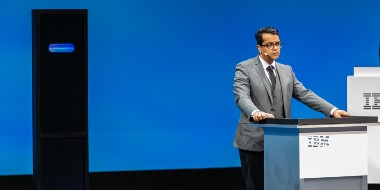IBM Research
Training Watson To Be Your Musical Muse
June 7, 2016 | Written by: Chris Nay
Categorized: IBM Research | IBM Watson
Share this post:
Watson already helps chefs and home cooks alike come up with never-before-eaten recipes. It also assists artists and helped one color coordinate a mural, and another make a cognitive dress for the Met Gala in New York. Now researchers are working to make the system capable of collaborating with musicians to produce original songs and scores.
Watson Beat is a cognitive cloud-based app being developed by machine learning and artificial intelligence expert Janani Mukundan, a Dire Straits fan with no musical training but a PhD in computer engineering, and Richard Daskas, a composer and professional musician.
Together, they have taught Watson about the specifics of rhythm, pitch, and instrumentation, as well as the differences in genres. All of it combines in algorithms running through Watson’s neural network to help artists create a original compositions.
“Watson Beat knows what sounds good to us. And based on input, it knows, for example that if a user wants a ‘dark’ or ‘gloomy’ song, that it should use a minor key,” Janani said.
Listen and learn
Watson Beat then keeps learning from its users. In as few as eight bars or 15 seconds of input, it can churn out a multi-instrument, minutes-long track that can be adjusted according to the mood and genre any budding Beethoven chooses. Here is a sample of an original piece by Richard:
Richard only wrote it for, and played it on the piano. But he decided to amp it up – give it an up-tempo sound with a bass line, drum kit, and a Middle Eastern beat. With just the sample above, here is what Watson Beat banged out:
“Watson Beat can understand MIDI (file) inputs of entire songs – even multiple songs – or individual instruments. Or, like the sample above, it can comprehend live play. I plugged a keyboard into my laptop and ran the app as I played,” Richard said.
Richard determined the upbeat style of the song, as well as the variation of the additional instruments, by introducing perturbations into Watson Beat’s neural network. These adjustments, done via an app, tell the system how similar or different the collaborative composition should be, compared to the original. This sliding scale of cognitive computing influence can come in especially handy for those whose last piano lesson stopped with Mary Had a Little Lamb!
The sound of opportunity
Watson Beat, like its smart app-in-the-cloud brethren, collaborates. It can help a musician get over writer’s block or remove hidden biases in genre or style by introducing something quite literally unheard of before. It might also be used in a music therapy setting.
For now, Janani and Richard’s creation is still a proof of concept. Attendees at SXSW, Tribeca, and Moogfest had a first-hand opportunity to listen to and even try creating their own music. Longer term, the pair wants to offer Watson Beat as an app for the public.
Listen to more samples on our soundcloud playlist.
Meet the Newest IBM Fellows
Since the first class of IBM Fellows in 1962, IBM has honored its top scientists, engineers and programmers, who are chosen for this distinction by the CEO. Among the best and brightest of IBM’s global workforce are 12 new IBM Fellows who join 293 of their peers who have been so recognized over the last […]
How IBM is Advancing AI Once Again & Why it Matters to Your Business
There have been several seminal moments in the recent history of AI. In the mid-1990s, IBM created the Deep Blue system that played and beat world chess champion, Garry Kasparov in a live tournament. In 2011, we unveiled Watson, a natural language question and answering system, and put it on the hit television quiz show, […]
AI in 2020: From Experimentation to Adoption
AI has captured the imagination and attention of people globally. But in the business world, the rate of adoption of artificial intelligence has lagged behind the level of interest through 2019. Even though we hear that most business leaders believe AI provides a competitive advantage, up until recently, some industry watchers have pegged enterprise adoption […]




